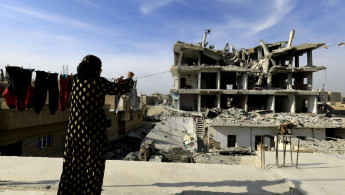US aid chief visits Syria's Raqqa in post-IS stabilisation push
The aid chief of the United States government made an unannounced visit to Raqqa on Monday, the most senior US civilian official from the Trump administration to visit the war-torn city since it was recaptured from the Islamic State.
In October, US-backed Syrian Democratic Forces (SDF) announced the landmark capture of Raqqa from IS after more than four months of fighting.
Raqqa was one of the most emblematic IS bastions, at the heart of both its military operations and its propaganda.
Aid chief Mark Green was accompanied by US Central Command General Joseph Votel on the visit, as the US ramps up post-conflict stabilisation in areas where IS was ousted.
Green said the civilian mission was not to rebuild but to help civilians return home by clearing roadside bombs, and restoring water and electricity.
"The mission for us is stabilisation not reconstruction," Green emphasised. "Our part of it is restoring essential services and there is a lot of work to do," he told Reuters.
The US fears that unless liberated areas are quickly stabilised they could fall back into the hands of militants.
Green said he would be traveling to Europe soon to press allies to help.
The visit comes after US Secretary of State Rex Tillerson signalled last week an open-ended US military presence in Syria as part of a strategy to prevent the resurgence of IS and create conditions for Syrian regime head Bashar al-Assad to step down.
Fred Hof, director of the Atlantic Council's Rafik Harari Center for the Middle East, said it was critical that the United States "seals the victory" in Raqqa through stabilisation.
"You don't invest three years in defeating ISIS and then fail to implement an obligatory aspect of military doctrine," said Hof, using another acronym for Islamic State.
The challenge, he added, was who would be left in command on the ground to ensure rebuilding took place.
Last week, the US-led coalition fighting the Islamic State group said it was working to create a 30,000-strong border security force in northern Syria.
The announcement drew sharp condemnation from Turkey due to the large Kurdish contingent in the planned border force.





 Follow the Middle East's top stories in English at The New Arab on Google News
Follow the Middle East's top stories in English at The New Arab on Google News
![The UAE is widely suspected of arming the RSF militia [Getty]](/sites/default/files/styles/image_330x185/public/2024-11/GettyImages-472529908.jpg?h=69f2b9d0&itok=Yauw3YTG)
![Netanyahu furiously denounced the ICC [Getty]](/sites/default/files/styles/image_330x185/public/2024-11/GettyImages-2169352575.jpg?h=199d8c1f&itok=-vRiruf5)
![Both Hamas and the Palestinian Authority welcomed the ICC arrest warrants [Getty]](/sites/default/files/styles/image_330x185/public/2024-11/GettyImages-2178351173.jpg?h=199d8c1f&itok=TV858iVg)